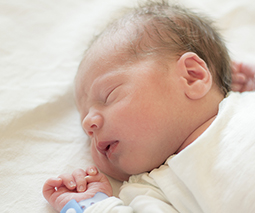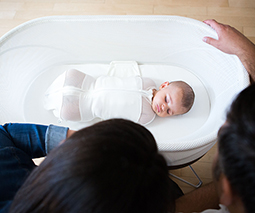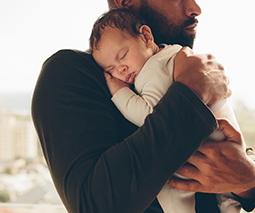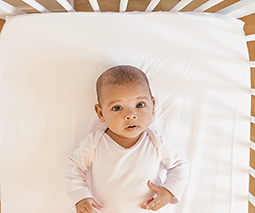How your baby’s temperament influences sleep

Every newborn baby is different, but the one thing they do have in common is that they will often wake during the night. However, even this can vary from child to child.
Some babies take to sleep routines easily, but for others, it can be more of a challenge. There are many reasons for sleep difficulties, and one of those is temperament. And while there is little you can do to change your baby’s temperament, there are ways to work with it so everyone can get a little sleep.
What is temperament?
A baby’s temperament is her disposition and how she responds to the world around her. She might be happy, quiet, easy-going or apprehensive. She might be reluctant to change, or she might be shy about meeting new people. These are all possible elements of a child’s temperament, which parents can immediately recognise even from those early newborn days.
There’s no right or wrong temperament, just differences; and by better understanding your baby’s personality, you will be able to approach bedtime in a way that will help to maximise her ability to sleep.
9 traits of temperament
Research undertaken by psychiatry professors Dr Stella Chess and Dr Alexander Thomas in a study that lasted from 1956 to 1977, identified nine temperament traits in infants.
- Activity – this is the amount of physical energy a child has for daily tasks and activities
- Regularity – the child’s natural biorhythms or regularity of functions such as eating or sleeping
- Initial reaction – this refers to a child’s response to a new object or person
- Adaptability – how a child adapts to changes in the environment or new situations
- Sensitivity – a child’s sensory threshold, or how a child reacts to changes in the environment
- Intensity – the intensity or amount of energy child puts into her responses
- Mood – the child’s general mood whether she is happy or not so happy
- Distractibility – a child’s tendency to be distracted from what she is doing
- Persistence – a child’s ability to stick to a task, despite any interruptions and distractions around her

3 general temperaments
The study revealed that some of these traits clustered together to create general temperaments in newborn babies which are: ‘easy babies’, ‘difficult babies’ and those who are ‘slow to warm up’.
1. Easy babies
These babies are positive in mood, have regular bodily functions and a low or moderated intensity of reaction. They are cheerful, quick and adaptable to new people and routines. Caring for these babies pose few problems for parents, which is why they are called the ‘easy’ children.
2. Difficult babies
These babies have irregular bodily functions, are negative in mood and have intense reactions. They withdraw from new situations, are slow to adapt, less flexible with changing routines and also cry a lot. These babies are considered a little more work or high need for parents.
3. Slow to warm up
Characteristics of ‘slow to warm up babies’ are low activity and low intensity of reaction. They also tend to withdraw from new situations, are slow to adapt and can be moody.
How does temperament affect sleep?
Babies all have different temperaments, but how does this affect their sleep patterns?
According to Dr Thomas and Dr Chess, these different types of temperament in babies mean they approach sleep differently. Babies with an easy temperament rarely have any issues with sleep, and they are quick to establish regular sleeping routines; they like routines and are happy to sleep and wake around the same time each day.
Babies in the difficult category are less likely to have regular sleep patterns and find it hard to adapt to new schedules and routine; they might wake in the middle of the night and find it challenging to go back to sleep. In fact, research shows that most children with sleep problems were more likely to that fall into this category.

How sleep and temperament are connected
It’s essential to take your baby’s temperament into account when trying to navigate those early sleepless days and nights. If your baby has irregular biorhythms and does not like to eat and sleep at the same times, then a strict routine will be more challenging. Early childhood educator, Kylie Rymanowicz from Michigan University says this might mean you have to wait until your child is sleepy, rather than insisting she sleep at a particular time.
“Letting your daily schedule and expectations vary to meet your child’s adaptability can prevent conflict and stress,” she reports in a Michigan State University publication. “It will also allow your child to have their needs met in a way that plays to their strengths and builds upon their natural temperament.”
If your child is less adaptable and unable to make smooth transitions from one activity to another, it may be better to stick to a regular routine.
How can I help my baby sleep?
According to the Department of Neurology at Columbia University, sleep difficulties can occur for many reasons like separation anxiety, over-stimulation and over-tiredness. Once you have a clear understanding of your baby’s temperament, it can help when trying to tackle these issues and establish sleep routines.
The experts at the Mayo Clinic say getting your baby to sleep isn’t about your parenting skills. Instead, it’s about taking the time to understand your baby’s habits and ways of communicating so you can help her to become better at sleeping.
The Mayo Clinic also offers handy tips that may help your baby get to sleep, depending on her individual needs or temperament. For example, if your baby is more active, she might need more time to settle. If she cries a lot, she might need more reassurance. If she doesn’t like change, she might need a set routine.
At the end of the day, as you learn more about your child’s temperament, her rhythms, personalities and reactions to what is happening around her, then you can adjust your schedule and routine to accommodate these traits, working with them rather than battling against them.
 Need some more baby sleep advice? Our Parent School sleep experts can help. Click to find out more or book a one-on-one session.
Need some more baby sleep advice? Our Parent School sleep experts can help. Click to find out more or book a one-on-one session.









